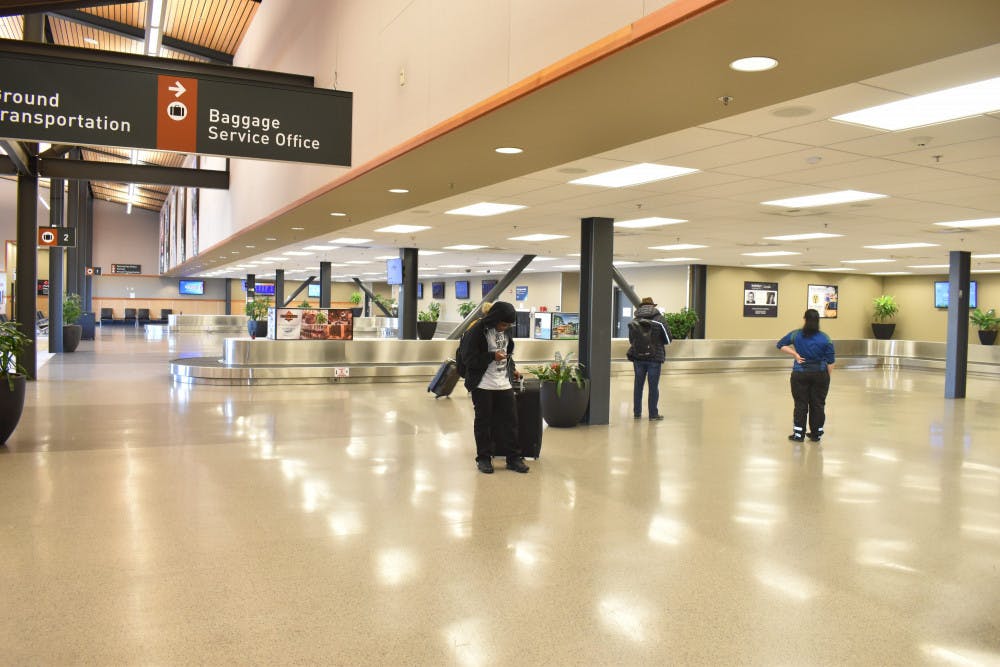By Leora Watson
During the novel coronavirus outbreak, is it worth the risk to travel? If one does travel with those temptingly low ticket prices, what precautions and information can help travelers stay safe?
According to the Centers of Disease Control and Prevention (CDC), there is low risk of catching COVID-19 on an airplane due to the way the air circulates and is filtered, which prevents germs and viruses from spreading. Travelers should avoid contact with sick passengers and wash hands or use hand sanitizer often, according to the CDC.
But what are airports doing to prevent the spread of the virus?
Hand sanitizer stations have been set up in airports around the country. Seattle-Tacoma International Airport installed 119 hand sanitizer stations throughout the airport, according to a Port of Seattle travel advisory.
Heavy-touch areas such as door handles, countertops, elevators and food court areas at Sea-Tac will be cleaned more often by janitorial staff, but travelers are encouraged to bring their own disinfectant wipes.
FlyerTalk, a popular website dedicated to travel news, has a dedicated hub for information about how airlines are managing the novel coronavirus, including guidance about whether to buy tickets in light of travel restrictions, and which airlines are reducing their routes to cut their losses.
Port of Bellingham spokesman Mike Hogan said Bellingham International Airport is following guidance from the CDC and Whatcom Health Department to keep travel as safe as possible, but there is additional flying risk.
“There’s been some decrease in service, and we are expecting to see some more. We’ve also taken extra precautions by cleaning and disinfecting the airplanes more frequently,” Hogan said.
During dead week, when students finish classes and prepare for finals, Western students had not reached a consensus in choosing to travel for spring break.
Sanskruti Kuravalli, a fourth-year Western student, said she made the decision to cancel her vacation for spring break.
“I was planning on flying to California with my family to go to Disneyland, but not anymore because California declared a state of emergency,” Kuravalli said. “My concern is risking the exposure to the virus. I do have some underlying health issues, so I have to be careful. And some of my family members are older and [I] don’t want to risk their health either.”
The Walt Disney Co. announced on Thursday that it would close its theme parks and cruise lines until the end of March in an effort to contain the novel coronavirus.
Sadie Gil, a third-year student, said she would travel next Wednesday to see family in Florida.
“I don’t necessarily feel safe traveling right now, but I am taking a lot of precautions like washing my hands a lot, sanitizing my seat, and my family sent me a mask to protect against the coronavirus,” Gil said. “I bought my ticket today and paid $400 for it. I normally pay over $600 for a round trip to Florida.”
Kendra Edmond, a third-year student, traveled to Seattle from Minneapolis on March 11 and got firsthand experience in an airport during the coronavirus outbreak.
“A lot of people on the plane canceled their flights, so I had a lot more space,” Edmond said. “People on the plane were wearing masks. I didn’t have a mask, I just had hand sanitizer and wipes and I would just wash my hands before I ate.”
Lily Nichols, Carl Bryden and Courtney Scott contributed reporting.
Related story: Pandemic weakens Bellingham's travel industry
Follow The Western Front on Facebook and Twitter for ongoing updates. Our full coverage of how the novel coronavirus is affecting Whatcom County is here.
If you're interested in contributing to the Front's reporting during this crisis, you are invited to participate in our open newsroom project, where experienced reporters and editors will work alongside the community to gather and verify information that leads Whatcom County toward shared solutions. To participate, please fill out this form.






